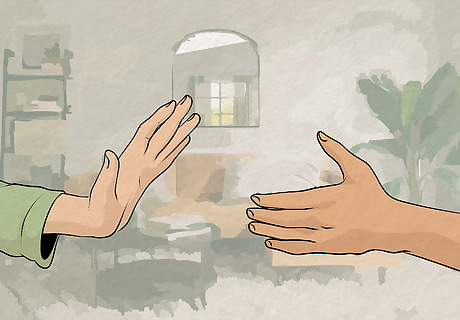
views
Resisting Manipulation

Be direct. If you suspect you’re being manipulated, don’t get baited into a pointless charade. Give your friend a chance to clear the air by asking them what they want without mincing words. A good friend will be honest—a scheming one will try to rationalize everything they say in an effort to stay in control. Avoid playing head games. They're a waste of time, and the longer they go on, the more leverage an experienced manipulator will have to get you to do their bidding. It’s usually a bad sign when someone isn’t willing to reveal their true thoughts or intentions. Sometimes, even just being silent after a person tries to manipulate you can speak volumes.

Keep a level head. Try not to take your friend's tactics personally. Respond calmly to their backhanded jabs or efforts to influence you. Feeling like you're being manipulated is enough to make anyone upset, but if you allow things to get heated, they'll just blow up into an even bigger issue. By maintaining your poise, you'll be more prepared to handle the situation productively. Making you angry might even be part of their plan, since it affects your ability to reason. Delay a confrontation until you've had time to cool off.

Learn to say “no” without feeling guilty about it. Don’t give in to their self-centered demands—set firm boundaries. No matter how close you and your friend are, you’re not obligated to do anything that goes against your conscience or makes you feel uncomfortable. Once you get used to saying no, you'll shift the balance of power in the relationship back toward the center. You don’t have to justify yourself or offer excuses. Simply say “I’m sorry, I can’t” and be firm. There may be times when a friend, even a manipulative one, needs your help. Use your best judgment to decide when you’re doing the right thing and when you’re getting played.

Stick up for yourself. People with manipulative personalities prey on low self-esteem. Speaking up when you feel challenged will send the message that you’re not going to be pushed around. As long as you have confidence, you won’t feel pressured to be something that you’re not. For instance, if you know someone who constantly ridicules your fashion sense to make themselves look better, you could respond by simply saying “I like the way I dress.” By going out of your way to accommodate a critical companion, you’ll only be doing their bidding.

Do what’s best for you. There’s a big difference between taking advice and taking orders. Don’t be afraid to tell meddlesome mates to butt out if they make a habit of interfering in your business. At the end of the day, you’re the only one who can make decisions on your own behalf. A true friend may not always like the other people you hang out with or approve of the guy or girl you’re dating, but they’ll never try to tell you that you shouldn’t see them. Spend some time reflecting on your personal values and limits. What are you OK with? What goes too far? This can help you establish boundaries with your friend.
Putting a Stop to the Problem

Point out what they're doing. Sometimes, your friend might not even be aware that they’re acting selfishly. Letting them know you feel could help them see the error of their ways. Once they're aware of how their words or actions are being perceived, you may find that they're careful not to repeat the same mistake in the future. Be careful not to sound like you're calling their character into question. Everyone can be manipulative from time to time. Getting the issue out in the open is often the first step to resolving it. Remember that they may be defensive when you bring this up. Remain calm and friendly as you chat.

Ignore their attempts to manipulate you. Like your grade school teacher always said, when someone does something mean to you, it’s best to just ignore them. Since manipulators do the things they do to feel important, tuning them out is a surefire way to render them powerless. This might be the most civil approach if you have a friend whose manipulative tendencies only show themselves occasionally. Remember: other people only have as much control over you as you give them.

Talk to your friend about an ongoing pattern. Work up the nerve to let them know that their behavior isn’t okay. Be prepared to bring up specific examples and explain how they made you feel. There’s no need for a hostile confrontation, but you should make it clear that you’re not willing to play the fool any longer. Rather than making potentially offensive statements like "You're a liar," which will likely just cause them to shut down, try something more tactful, like "I think it's unfair that you twist my words when it suits you." Keep in mind that the cycle is likely to continue unless you put your foot down once and for all. If the manipulation is new, pay attention to whether there's anything that's recently changed in your relationship that could be making one or both of you anxious. For instance, is one of you getting ready to move for a new job? That could be a factor in why it's happening.

Stand your ground. A skilled manipulator will try to make you seem like you’re the one that's somehow at fault. They might accuse you of being jealous or insecure, or attempt to turn the tables by seeming hurt. Don't listen to them. You have a right to speak up when you're being treated unfairly. Be on the lookout for openings that your friend might use to avoid a discussion, like undermining your feelings or playing the whole thing off as a joke. If your friend says something like, "you're being too sensitive" or "you're overreacting," remember that they may be trying to manipulate you again. If you're upset, you have a right to let your friend know.

Weigh the pros and cons of ending the friendship. If you’ve alerted your friend that you find their behavior hurtful and they refuse to take responsibility, you may have no other choice than to phase them out of your life. Breaking off a long friendship isn’t easy, but you’ll be better off in the long run. Just make sure it's what you really want before you decide to pull the plug. When angered, your friend might resort to childish or hurtful tactics, like complaining about you to mutual acquaintances or spreading rumors. Ignore them. This is just further proof that they were never really your friend in the first place. Resist the temptation to slander your former friend to others. Be the bigger person and let it go.
Identifying a Manipulative Friend

Pay attention to the way they talk about others. Manipulators often use criticism as a way to make themselves look superior. If your friend never has anything good to say about the people around them (including their other friends), they typically won’t hesitate put you down when you’re not around. In some cases, they might even go out of their way to try to make you feel small to your face. It’s rare that you’ll hear a person with a manipulative personality accept responsibility for their own faults. In their minds, they can do no wrong. Staying friends with a manipulator could mean finding yourself the subject of gossip or rumors.

Learn to recognize guilt trips. Beware of people who are always bringing up past events (like loaning you money or helping you through a difficult time) just to hold them over your head. This is a sure sign of entitlement—they feel like you owe them something, no matter what the circumstances are. Stop allowing yourself to be tricked into feeling guilty when you shouldn’t. When you take what you’re being told at face value, you’ll be more eager to please in order to get back into your friend’s good graces. Be up front when you suspect you’re being guilted into doing something. It will help your friend see the error of their ways if they’re doing it unconsciously, and let them know that you’re onto them if they’re doing it intentionally. A manipulative friend might try to blame you for something going wrong, even when you had nothing to do with it. If you suspect this to be the case, try not to take it personally.

Ask yourself whether your friend has been reliable in the past. Think about the times that your friend has really been there for you when you needed them. If you’re having trouble recalling any of these times, it may mean that your friend is a user. One-sided relationships only benefit the manipulator, which is the way they want it. Try asking your friend for a small favor. The lengths they’re willing to go to help you can tell you a lot about how much they value your friendship.

Determine whether your friend is actually being manipulative. Don’t just assume that they’re trying to control you or hurt your feelings. There’s a chance that they’re telling you something they genuinely think you need to hear. A manipulative person, on the other hand, will always have themselves at the center of their motives. For example, let's say you've had a bad day at work. Most friends would try to cheer you up. A manipulative friend, however, might try to one-up you by talking about how their day was worse. Look for a pattern of all take and no give in your relationship. This is a good indication that your friend is taking advantage of you whether they realize it or not. Accusing your friend without a good reason may just cause unnecessary tension.

Reassure yourself that the problem is with them, not you. You might start wondering whether you’re just being sensitive or overreacting, but don’t second guess yourself. Part of their strategy is to make you feel like you’re the one who’s in the wrong. What they’re doing is unfair, and you owe it to yourself not to let it continue. Manipulative people will often try to blame you or diminish your feelings. They might say "you're imagining this" or "why can't you take a joke?" Try not to let these tactics change your mind. You have a right to assert your boundaries. Making excuses for self-serving friends will only make it harder to tell when they’re using you.




















Comments
0 comment